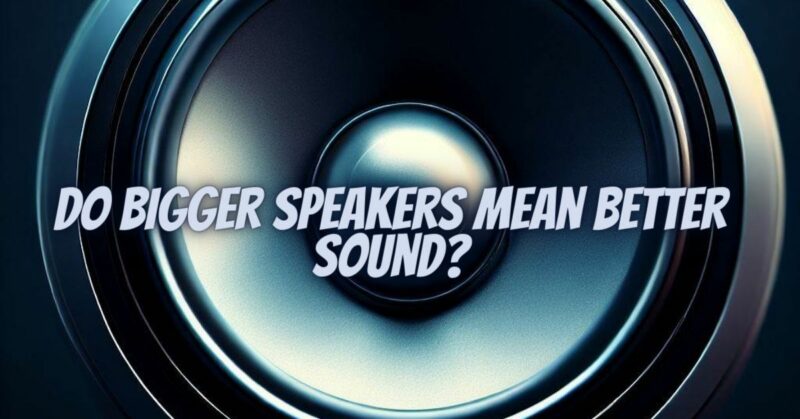Whether bigger speakers mean better sound is a complex question with no easy answer. It depends on a number of factors, including the specific speakers being compared, the type of music being played, and the listener’s preferences.
In general, bigger speakers have a number of advantages over smaller speakers, including:
- Greater frequency response: Bigger speakers have larger cones, which can move more air to produce lower frequencies. This means that big speakers can reproduce a wider range of frequencies than small speakers, resulting in a more full-bodied and realistic sound.
- Lower distortion: Bigger speakers can produce high sound levels with less distortion than smaller speakers. This is because they don’t have to work as hard to produce the same volume level.
- Better imaging: Bigger speakers can create a more precise soundstage, with instruments and vocals appearing to come from specific locations in the room. This is because they have a wider dispersion pattern, meaning that the sound waves spread out more evenly.
However, there are also some potential drawbacks to bigger speakers, including:
- Cost: Bigger speakers are typically more expensive than smaller speakers.
- Size and weight: Bigger speakers are also typically larger and heavier than smaller speakers, which can make them more difficult to place and transport.
- Power requirements: Bigger speakers typically require more power to drive them than smaller speakers.
Ultimately, whether bigger speakers are better than smaller speakers is a matter of personal preference. If you are looking for the best possible sound quality and are willing to pay more for it, then bigger speakers are a good choice. However, if you are on a budget or need speakers that are easy to place and transport, then smaller speakers may be a better option.
Here are some tips for choosing the right speakers for your needs:
- Consider your budget. Speakers can range in price from a few dollars to several thousand dollars.
- Think about the size of your room. Bigger speakers are better for larger rooms, while smaller speakers are better for smaller rooms.
- Consider the type of music you listen to. If you listen to a lot of bass-heavy music, then bigger speakers may be a better choice. If you listen to a variety of music, then smaller speakers may be a better option.
- Listen to different speakers before you buy. This is the best way to determine which speakers sound best to you.
If you are not sure which speakers are right for you, ask a salesperson for help. They can help you choose speakers that fit your needs and budget.


